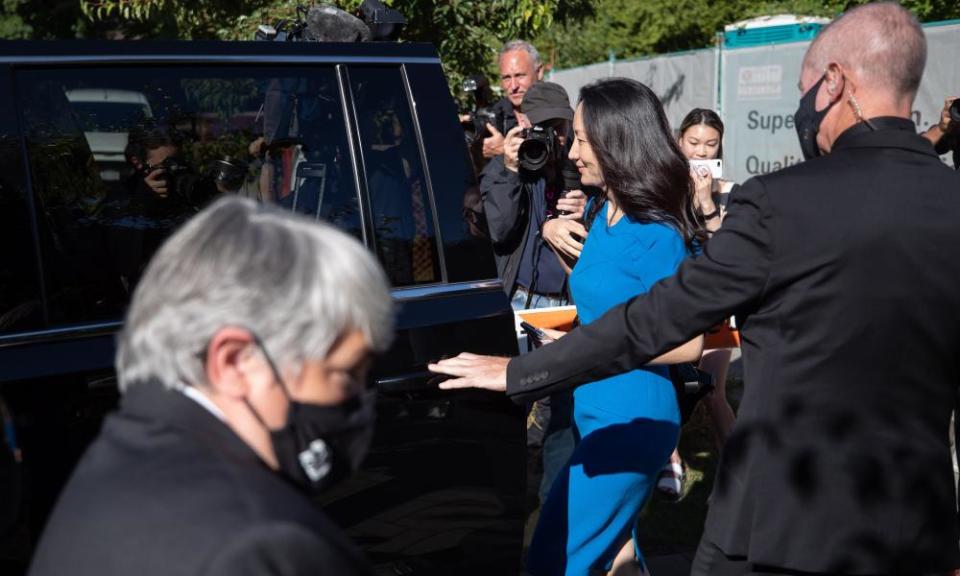‘Bad faith’ US prosecutors misled Canada in Huawei case, court hears in final arguments

Lawyers for Meng Wanzhou say American prosecutors acted in “bad faith” and abused the Canadian justice system when they pursued the Huawei chief financial officer, in final arguments of the telecoms executive’s closely watched extradition proceedings.
In a Vancouver courtroom on Wednesday, Meng’s legal team argued that American prosecutors misled the Canadian justice system in their legal summary of the allegations against Meng. Her team says this abuse of process obliges the judge overseeing the case to toss out the extradition request against Meng and set her free.
Related: Canada risks being outplayed in feud over citizens jailed in China
The long-shot argument is part of a strategy to free the telecoms executive, whose detention has been at the centre of an ongoing feud between the United States and China – with Canada caught in the middle.
American prosecutors allege that Meng misled bankers at HSBC about Huawei’s relationship with SkyCom, putting HSBC at risk of violating American sanctions against Iran. Both she and Huawei have denied the charges. She was detained by Canadian officials at Vancouver’s main airport December 2018.
Meng’s lawyers have previously claimed her rights were breached by comments made by then president Donald Trump, collusion between the two countries to share protected information, and a lack of international jurisdiction.
To be successful in their latest strategy, Meng’s lawyers must convince a British Columbia judge that American prosecutors misled the Canadian justice system to the extent that it “shocks the conscience” of the country – a legal test stemming from a famous 1987 extradition case.
But her team does not have history on its side. According to data from the Canadian government, of the 798 requests made since 2008, only eight have been granted.
“This is not a trial. This is an extradition procedure under a treaty that is very much geared towards transferring the accused,” said Michael Byers, a political science professor at the University of British Columbia. “The presumption is that the extradition will move forward and questions over evidence and law will be left to the trial in the United States.”
Wednesday’s legal salvo marks the second recent attempt by the defence to unspool the case against their client.
Last month, associate chief justice Heather Holmes ruled against allowing new evidence in the case, saying the email chains and spreadsheets unearthed by the defence did not “expressly” support Meng’s claim that the US summary of allegations against her were “manifestly unreliable”.
The decision was a major disappointment to Meng’s team, which had hoped the the inclusion of new evidence would prove to be a ‘fatal blow’ against the US claims and would secure her release.
Byers likened Meng’s legal gambit to “throwing a whole lot of spaghetti at the fridge” in the form of arguments designed to delay the process for as long as possible.
“I don’t see most of these arguments being taken seriously by the lawyers making them,” he said. “They seem like a strategy of burning the judge in a whole lot of paper and procedure.”
The abuse-of-process arguments are expected to last nearly a month, with a decision likely rendered by Holmes in the fall.
Even if Meng is unsuccessful in convincing the judge that the Americans acted improperly, it could still be years before the appeals process is fully exhausted.
Meanwhile, there have been whispers of a potential deal between the United States and China that could secure Meng’s release. While the Americans might opt to fully withdraw the extradition request, Byers suggested the White House might also propose a deferred prosecution agreement, thus allowing the United States to save face while getting Huawei to admit culpability.
“Once there is a decision from the judge, there may be an opportunity for a political move by the United States,” said Byers. “Obviously, everyone is interested to see how [Holmes] rules on this.”
The highly political nature of her case has chilled relations between Canada and China. The detention of two Canadians Michael Spavor and Michael Kovrig, both charged with espionage, is widely seen as retribution for Canada’s role in the extradition of Meng.
“It is obvious that the two Michaels were arrested on trumped-up national security charges days after we fulfilled our extradition treaty responsibilities toward our ally, the United States,” prime minister Justin Trudeau told reporters in March.
The two have been held in jail in China for nearly 970 days. Meng, however, was granted bail early on in the process and lives in a multi-million dollar mansion in Vancouver.
But remarks from the Canadian government could make securing the release of the two men difficult.
“The biggest mistake the Canadian government made was to explicitly link the detention of the two Michaels to the extradition process involving Meng. They created a situation where the Chinese cannot release the two Michaels now without losing face,” said Byers. “The fate of the two Michaels is now tied inextricably to that of Meng Wanzhou.”

 Yahoo News
Yahoo News 